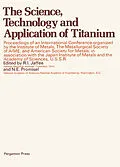The Science, Technology and Application of Titanium contains the proceedings of an International Conference organized by the Institute of Metals, The Metallurgical Society of AIME, and the American Society for Metals in association with the Japan Institute of Metals and the Academy of Sciences of the USSR and held at the Royal Festival Hall in London, on May 21-24, 1968. The papers explore scientific and technological developments as well as applications of titanium and cover topics ranging from processing of titanium to its chemical and environmental behavior, physics, thermodynamics, and kinetics. Deformation and fracture, phase transformations and heat treatment, and alloying are also discussed.
This book is comprised of 114 chapters and begins with an overview of the titanium industry in Europe and the United States. The reader is then introduced to primary and secondary fabrication of titanium; corrosion and oxidation; physical properties of titanium alloys; interaction of titanium with elements of the periodic system; and elastic interactions between dislocations and twin and grain boundaries in titanium. The crystallography of deformation twinning in titanium is also examined, along with superplasticity and transformation plasticity in titanium. The remaining chapters focus on interstitial strengthening of titanium alloys; mechanism of martensitic transformation in titanium and its alloys; phase relationships in titanium-oxygen alloys; strengthening of titanium alloys by shock deformation; and titanium hot forming.
This monograph will be of interest to chemists and metallurgists.
Inhalt
Foreword
Preface
Section I. Introductory Papers
Opening Address
Titanium in U.S.A.
Titanium in Europe
Section II. Processing of Titanium
Part A. Primary Fabrication
Application of Solidification Theory to Titanium Alloys
Research on the Quality of Commercially Pure Titanium and Ti-6A1-4V Ingots
Chemical and Structural Microinhomogeneity, Diffusion and Mechanical Properties of Titanium Alloys in Connection with Phase Transformation Characteristics
Choice of Vacuum-Arc Melting Parameters to Ensure Ingot Chemical Homogeneity
Properties of Wrought Shapes Formed from Electroslag-Melted Titanium
Titanium in the U.S.S.R.
Part B. Secondary Fabrication
Forgings in Titanium Alloys
The Beta Forging of Titanium Alloys
The Effect of Beta Processing on Properties of Titanium Alloys
Heavy Press Forging of Large Titanium Alloy Parts for Aircraft and Aerospace Applications
The Mono Graf Casting Process
Precision Casting of Titanium
Discussion Part A
Discussion Part B
Section III. Chemical and Environmental Behavior
Part A. General Corrosion and Oxidation
Hydriding of Titanium Used in Chemical Plant and Protective Measures
Anodizing of Titanium Equipment
Reaction Rate of Titanium and Titanium Alloys with Titanium Lower Chlorides
The Oxidation of Titanium Films
Air Contamination and Embrittlement of Titanium Alloys
Corrosion Resistance of Titanium and Titanium-5% Tantalum Alloy in Hot Concentrated Nitric Acid
Utilization of Anodic Breakdown of Titanium Alloys as a Method of Characterization
Corrosion Test for Evaluating the Corrosion Resistance of Titanium
Titanium Electrode for the Manufacture of Electrolytic Manganese Dioxide
Part B. Stress Corrosion
Electrochemical Mechanism in the Stress Corrosion Cracking of Titanium Alloys
The Stress Corrosion Cracking of a-Titanium Alloys at Room Temperature
Some Characteristics of Aqueous Stress Corrosion in Titanium Alloys (Summary)
Ambient Temperature Stress Corrosion Cracking in Ti-8Al-1Mo-1V
Stress Corrosion Cracking in Titanium and Titanium Alloys
Stress Corrosion Cracking of Titanium and Ti-Al Alloys in Methanol-Iodine Solutions
Effects of Halogen Containing Hydrocarbons Upon Stressed Ti-6Al-4V Alloy
Cracking of Titanium Alloys under Stress during Oxidation in Air
Hot-Salt Stress Corrosion Cracking of Titanium Alloys
Discussion Part A
Discussion Part B
Section IV. Physics, Thermodynamics and Kinetics
Physical Properties of Titanium Alloys
The Crystallographic Structure of Ti3Al
Thermodynamic Properties of the Body-Centered Cubic Beta-Phase in the Titanium-Copper and the Titanium-Aluminum Systems
Calculation of Regular Solution Phase Diagrams for Titanium Base Binary Systems
The Single Crystal Elastic Moduli of Beta-Titanium and Titanium-Chromium Alloys
Computer Experiments on Point Defect Configurations and Energies in Ti-M Systems
Behavior of Hydrogen in Titanium and its Alloys by Internal Friction Measurement
Stress-Induced Diffusion of Carbon and Oxygen in Titanium
Interaction of Titanium with Elements of the Periodic System
Discussion
Section V. Deformation and Fracture
Elastic Properties of Dislocations in Titanium
Elastic Interactions Between Dislocations and Twin and Grain Boundaries in Titanium
Strain Distribution in Oxidized Alpha Titanium Crystals
The Crystallography of Deformation Twinning in Titanium
Slip Modes and Dislocation Substructures in Titanium and Titanium-Aluminum Single Crystals
Interstitial Strengthening of Titanium Alloys
Effects of Interstitial Content and Grain Size on the Mechanical Behavior of Alpha Titanium below 0.4Tm
A Thermal Plastic Deformation in Commercial Purity Titanium
Effect of Cyclic Stresses on Unalloyed Polycrystalline Titanium
Fatigue Behavior of a-Titanium and a-Titanium-Hydrogen Alloys
Deformation-Assisted Nucleation of Titanium Hydride in an Alpha-Beta Titanium Alloy
The Temperature Dependence of Fracture Behavior in a-Titanium-Hydrogen Alloys
Hydrogen Embrittlement of Titanium and its Alloys
Hydrogen Embrittlement of Titanium as a Part of the Problem of the Brittle-Ductile Transition Temperature of Metals
Phase Transformations During Welding and the Mechanism of Delayed Cracking of Titanium Alloys
Transformation Plasticity of Titanium
The Hot Plasticity of Ti-6Al-4V
Superplasticity in Titanium
Discussions
Section VI. Phase Transformations and Heat Treatment
Part A. Phase Transformations
Some Aspects of Phase Transformations in Titanium Alloys
Mechanism of the Martensitic Transformation in Titanium and its Alloys
Martensitic Transformations in Titanium Alloys
The Effect of Cooling Rate on the Beta Transformation in Titanium-Niobium and Titanium-Aluminum Alloys
Thermodynamics of the Ms Points in Titanium Alloys
Continuous Cooling-Transformation of Beta-Phase in Binary Titanium Alloys
Phase Transformation of Titanium Alloys by Means of Automatic Transformation Apparatus
The Morphology of the Omega Phase
The Stability of the Omega Phase in Titanium and Zirconium Alloys
Note on the Structure of the Omega Phase
An Electron Microscopy Study of Phase Transformations in Titanium-Copper Alloys
Phase Relationships in Titanium-Oxygen Alloys
Part B. Effect on Mechanical Properties
The Martensitic…
